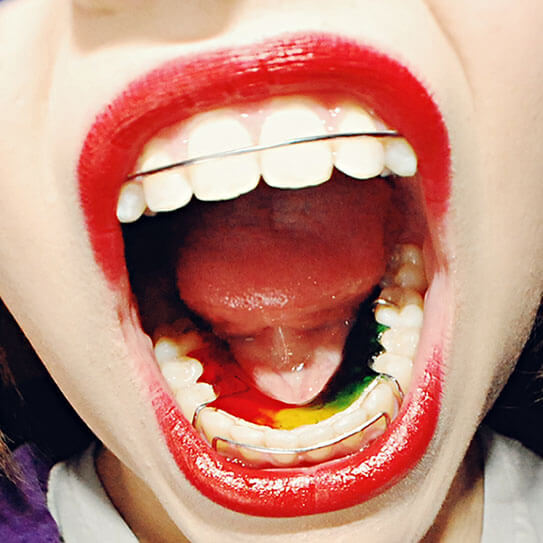
THE BEST DAY FOR every orthodontic patient is braces off day, but that’s not where treatment ends. To maintain those great results, it’s critical to wear retainers as instructed. So let’s take a look at the different kinds of retainers out there.
The Classic: Hawley Retainers
Everyone knows about the classic metal and acrylic retainers. This is the oldest type of retainer, and it still holds up well compared to newer types. These retainers are made of wire that fits precisely around the upper teeth, anchored in a plate that is usually made of acrylic. To keep them from becoming smelly and gross, brush them when you take them out and follow the specific storage and deep cleaning instructions.
Low Profile: Clear Plastic Retainers
For those who are eager to show off their straight smile without the obvious hardware of a Hawley retainer, clear plastic retainers are a great option. As with Hawley retainers, however, it’s essential to take good care of clear plastic retainers so they will last as long as possible and continue maintaining your teeth in their properly aligned position.
Make sure to carry a case with you if you wear your retainers during the day, and only store them in the case when they aren’t in your mouth (your pocket is not a good place for a retainer!). Take them out to eat and only drink water while wearing them.
Built In: Fixed or Bonded Retainers
There are also permanent retainers, commonly called fixed or bonded retainers. These are thin wires cemented across the backs of certain teeth to keep them in their post-braces position. Most often, they are used on the bottom front six teeth, but they may sometimes be used to keep a gap closed between the upper front teeth.
Fixed retainers come with many advantages. The most obvious are that you don’t have to remember to put them in and you can eat with them in. However, because you can’t take them out, cleaning them can get tricky, and it can make brushing and flossing tricky too. It’s essential to brush and floss carefully around the permanent retainers because plaque and tartar can easily build up. Floss threaders or a water flosser might be a great solution for you.
Questions About Retainers?
If you’re not sure which type of retainer is best for you, just ask! We’re dedicated to making sure each patient has the best retainers to suit their situation and preferences, and we want you to have all the information you need.





